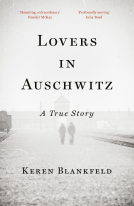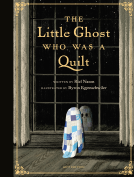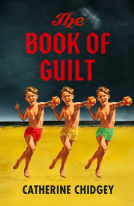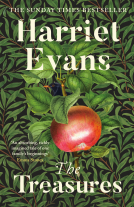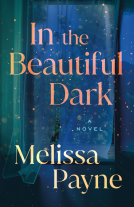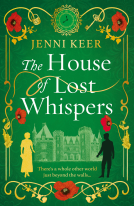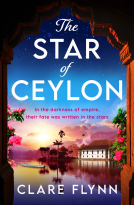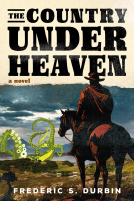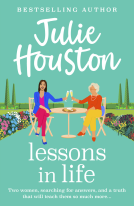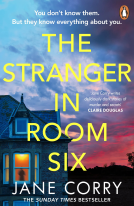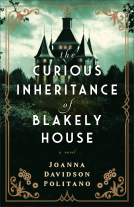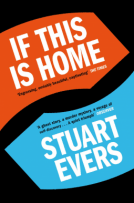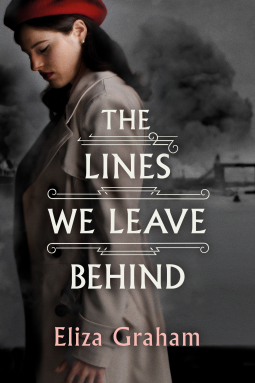
The Lines We Leave Behind
by Eliza Graham
This title was previously available on NetGalley and is now archived.
Send NetGalley books directly to your Kindle or Kindle app
1
To read on a Kindle or Kindle app, please add kindle@netgalley.com as an approved email address to receive files in your Amazon account. Click here for step-by-step instructions.
2
Also find your Kindle email address within your Amazon account, and enter it here.
Pub Date 1 Nov 2018 | Archive Date 29 Nov 2018
Amazon Publishing UK | Lake Union Publishing
Talking about this book? Use #TheLinesWeLeaveBehind #NetGalley. More hashtag tips!
Description
“The Lines We Leave Behind is mesmerizing; a deeply affecting story of treachery, deception, sacrifice, and loss. Beautifully written and completely absorbing…” —Karen Dionne, author of the internationally bestselling The Marsh King’s Daughter
England, 1947: A young woman finds herself under close observation in an insane asylum, charged with a violent crime she has no memory of committing. As she tries to make sense of her recent past, she recalls very little.
But she still remembers wartime in Yugoslavia. There she and her lover risked everything to carry out dangerous work resisting the Germans—a heroic campaign in which many brave comrades were lost. After that, the trail disappears into confusion. How did she come to be trapped in a living nightmare?
As she struggles to piece together the missing years of her life, she will have to confront the harrowing experiences of her special-operations work and peacetime marriage. Only then can she hope to regain the vital memories that will uncover the truth: is she really a violent criminal…or was she betrayed?
A Note From the Publisher
At Oxford University she read English literature on a course that regarded anything post about 1930 as too modern to be included. She retains a love of Victorian novels.
Eliza lives in an ancient village in the Oxfordshire countryside with her family. Her interests (still) mainly revolve around reading, but she also enjoys walking in the downland country around her home.
Find out more about Eliza on her website: www.elizagrahamauthor.com. You can also follow her on Twitter: @Eliza_Graham.
Available Editions
| EDITION | Other Format |
| ISBN | 9781503903838 |
| PRICE | US$24.95 (USD) |
Featured Reviews
 Rosemary S, Librarian
Rosemary S, Librarian
There have been a lot of World War II novels published lately, and I believe in some ways it’s because we want to remember a time when we knew what we were fighting for, when the difference between good and evil was apparent for all to see. This story deals with the aftermath of the war and the personal devastation it brought down on one woman, now locked up in a mental hospital for a violent crime she cannot remember committing, As she revisits the past she does remember, Yugoslavia and the atrocities of the war there, it’s no wonder much of her recent memory is blank. She must find a way to reconstruct the memories she has chosen to bury, even if she risks uncovering something unbearable
 Julie H, Reviewer
Julie H, Reviewer
I got really caught up in this story from the start. It is a part of history that I knew very little about. It is a hard read in places and the story has obviously been well researched and well thought out. In a lot of ways this is a sad story. Maud loses so much of her life due to events beyond her control. It is good that events in World War 2 are being remembered and talked about.
Thank you to Netgalley for my copy.
A great book. This was a well throughout book. It certainly makes you remember and think about our WW2 soldiers.
Thank you to both NetGalley and Amazon for my eARC in exchange for my honest unbiased review
Last week I was hit with a one-two punch of historical fiction. First, it was Kristin Hannah’s brilliant The Great Alone, set mostly in 1970s and 1980s Alaska. Then it was Eliza Graham’s tautly paced The Lines We Leave Behind, a suspenseful story of an amnesia-afflicted woman who is in an asylum post-WWII that played havoc with my nerves.
When the book opens, we’re in 1947 England, and Maud’s psychiatrist Dr. Rosenstein encourages her to write down her memories.
This is what Maud initially remembers: in 1943 Maud Knight was a well-off young woman living in Blitz-era London, seemingly without purpose. She had affairs, she had an unimportant job, but no higher calling. She was approached by a magnetic man, Robert Havers, who expressed admiration for her special talents—including her ability to speak Serbo-Croat, to observe details keenly, to memorize them—and he offered her a position as a British secret agent aiding Partisan (communist) forces fight other fringe groups (and ultimately the Germans) in Yugoslavia and rescuing downed Allies and returning them back home.
Maud accepts the position, and she’s given the name Amber. In Yugoslavia, she learns real danger, real pain, for the first time, and she becomes aware of the complicated lines wartime can drive between family members and neighbors, and how it can test the physical self and the spirit.
That was Maud then.
But something’s happened in the years since, to turn someone who served her country so admirably into a mental asylum resident, and that’s the gripping story that unfolds for Maud, Dr. Rosenstein, and the reader, page by page.
The Lines We Leave Behind tells a story that I haven’t quite heard before, in a place that I haven’t a read a story set in. Graham deftly portrays the toll of war, illuminating how it changes people, and how it makes heroism and depravity possible—sometimes within the same person. This is a heavy story (seriously), but it is also one that is not without redemption, and those slices of light are what I like best about it.
This well-written book is by turns exhilarating and disturbing, and entirely haunting.
**I received a copy of this book from Netgalley, but all opinions provided are my own.
 Diana B, Reviewer
Diana B, Reviewer
This book took me in from page one. I,could not put it down, my kindle came everywhere with me. A women of two sides who is in a mental hospital because of things that happen in the war and after. It is also a love story. There is no happy ending to the love, and a child she has never seen believes she is dead. A very good book about the 2nd world war.
 judy h, Librarian
judy h, Librarian
I'm sure this book would be popular in our library, even though it's not a style of book I enjoy. Suspense and mystery are really popular with our readers.
Unfortunately, I don't think I"m quite the audience for this book. While I love historical fiction, especially that which focuses on women, I'm not into the whole spy thing. I've never enjoyed spy novels, nor have I been interested in spy movies, but I wanted to give this book a try because it didn't seem like it was going to be that big into The Spy Thing.
I didn't feel particularly pulled in by either the plot or the characters, and I found Maud/Amber's whole story confusing and unsatisfying even in the end. Is she Maud? Is she Amber? Is she mentally ill? Is Amber born of Maud? Who is Maud without Amber? These questions should be ones to drive the reader and the plot, but I found myself unattached to the point where I couldn't find any interest in what happened to the characters.
Goodreads has given this novel all kinds of high ratings and reviews, so I'm glad that there are those out there who enjoy it. Again, though, I don't think this was the book for me. Trigger warnings for sexual assault apply.
Loved the book!!! After I read the description of the book, I knew I had to read it and it definitely didn't disappoint. From the moment I started reading the first chapter about Maud being in an asylum, I was hooked and didn't want to put the book down. I needed to find out why she was there. Woodlands Asylum actually seemed like a nice place, not the usual scary asylums you might see on American Horror Story. I loved Maud. She was so strong and brave. She endured a lot in such a short time, especially with regards to Robert.
Maud finds herself in Woodlands Asylum. She has two identities- Maud and Amber. Amber was who she was during her war service. She is working with her doctor to recover her memories. Pretty much everything that happened to Maud revolves around Robert. Robert is the reason Maud ended up doing service in Yugoslavia during World War. Robert was was a dangerous, manipulative man with many secrets. Eventually Maud's memories come back. She remembers her training, Yugoslavia and how she ended up in the asylum. Finally all the secrets are revealed and Maud learns the truth about what happened.
I loved the story, characters and writing style. I loved that it centered around Yugoslavia during WWII. I also loved Maud's interaction with Naida and Esma. For the way Maud risked her life and saved so many other people, it was sad to see where she ended up and how she was ultimately treated. She missed out on so many things.
I definitely recommend this book, especially if you enjoy historical fiction with a bit of a mystery. I look forward to reading more books by the author.
Thanks to NetGalley, Amazon Publishing UK and the author, Eliza Graham, for a free electronic ARC of this novel.
I love World War 2 Historical Fiction and I really enjoyed this novel and it was also a thriller which is a plus! It had an interesting plot of a young woman in an insane asylum a few years after the war without a clue to as why she is there. The story unfolds between her time before and during the war and her time in the present, in the asylum. I found the Maud/Amber character easy to connect with and personable. I thought the book somewhat glossed over the training and some parts of the war but it kept me intrigued with the action and plot twists. I will be adding Eliza Graham to my lists of authors to read.
Thank you Lake Union Publishing and NetGalley for the Advanced Reader Copy in exchange for my honest review.
 Jennie C, Reviewer
Jennie C, Reviewer
The Lines We Leave Behind follows the story of Maud during the 1940's. Maud is a woman in her twenties who is in a mental asylum for a crime she does not remember committing. Through therapy she begins to remember the last few years of her life. The story is told in flashback format as she is remembering what happened.
The story is very interesting but the problem I have with it is how I felt towards her husband. While he is a character in the book he seems to almost not be present. Some times you have a character who never appears in the book but feels so present to you as the reader and this is almost the opposite. You don't know him enough as a character to have a strong reaction to the things he does to Maud. I think that is the main reason my rating is so low for this one (especially since this is a perfect genre for me).
I also had issues with the ending. Maybe because the horrible thing did not create strong emotions in me, the slightly happy ending does feel right.
I would be interested to know how others felt about this book.
I received an advanced digital copy of this novel in exchange for my honest review. Thanks to Netgalley.com and Amazon Publishing UK for the opportunity.
The book opens in an unexpected setting for a WWII story. An asylum. We learn about the main character through memories and conversations with her therapist. Is she as insane as she thinks she is? Was she betrayed?
An engrossing story of female operatives behind enemy lines. Well researched and written.
 bonnie s, Librarian
bonnie s, Librarian
Not my favorite style of writing, the back and forth in time can be more than a bit confusing, particularly until the middle of the book where it all starts to come together. All in all, a compelling tale, that I would only like to have seen tied together better earlier. Overall, I loved it, and will be recommending this to everyone!
 Beverley C, Educator
Beverley C, Educator
Well researched and absorbing. A masterfully written historical storyline. Heartily recommend it to readers who, like myself, enjoy this genre.
The Lines We Leave Behind is historical fiction about WWII and a woman in an asylum who cannot remember what she may have done. It's a frightening premise although engaging. Slowly paced, the heroine reveals things about events she experienced. I won't spoil anything. I will say this story is darker than I expected and disturbing at times. I recommend. It's very good overall.
The story opens in England, the year is 1947. Maud is in Woodlands Asylum, charged with a violent crime that she doesn't remember.
Going back and forth from 1943, to the present, she writes down events as she recalls them and reviews them with her therapist, Dr. Rosenstein. As Maude slowly starts to recover her memories, she tells the doctor of meeting Robert Havers, an Intelligence agent during the war. He begins recruiting her for a special operation. They need a woman fluent in Serbo-Croat to parachute into an active war zone in northern Yugoslavia. Working with the Partisans, her main role is to pass information about parachute drops and landings, picking up downed Allied airmen and escaped POWs for rescue.
She changes her identity to Amber and begins training in Cairo, along with Naomi, a Jewish agent being sent in to set up resistance groups. While training, Amber has an affair with Robert, and begins to fall in love with him.
Once Amber and Naomi parachute into Yugoslavia, things immediately start to go wrong. It seems like the enemy is one step ahead of them. Have they been infiltrated by a spy?
Tension mounts as Maude gets closer to finding out why she is locked up, and we finally learn the truth of the betrayals she has suffered.
A powerfully moving and intriguing story. One you won't soon forget. I thoroughly recommend reading this engrossing historical fiction novel.
Thank you to Lake Union Publishing and NetGalley for the free ebook in exchange for an honest review.
 Sally C, Reviewer
Sally C, Reviewer
The story starts in 1947 with Maud in an asylum accused of a violent crime...... but did she do it, she has no memory if doing so. Through sessions with her therapist we start to learn her story as she has flashbacks and recovers her memory. She had an a alter ego, Amber, as she was recruited in the war to go undercover in Yugoslavia.......... but who could she trust.... and what about Robert the man she fell in love with?
A great book that, although fairly slow burning to start of with, I couldn't put it down until I had uncovered all of the secrets and one of those books that stays with you after you have finished it
 Reviewer 238609
Reviewer 238609
This is a story that keeps you wondering. It is about a girl in an insane asylum after WWII and her involvement in it. I would recommend this book to fans of historical fiction.
I would like to thank Netgalley and the publisher for providing me with a copy of this book free of charge. This is my honest and unbiased opinion of it.
 Tina M, Reviewer
Tina M, Reviewer
An original, suspenseful story based on WW2 secret agent and partisan activity from London to Yugoslavia and all the drama and trauma suffered therein, as a woman struggles to recall her past from an asylum with the aid of a psychiatrist. This story just got better and better the more I read, it held my attention and expanded my typical France/Germany/UK WW2 reads because this one was based on war in Serb/Croat/Yugoslav territory which I knew very little about. The characters were well written, though I disliked Robert immensely (credit to the author for evoking such strong emotion in me!) as was the plot. Lastly, what a beautiful book cover too! With thanks to Netgalley and Lake Union Publishing for the digital copy to review.
 Sue B, Reviewer
Sue B, Reviewer
Thankyou to NetGalley, Amazon Publishing UK, Lake Union Publishing and the author, Eliza Graham, for the opportunity to read a digital copy of The Lines We Leave Behind in exchange for an honest and unbiased opinion.
What an incredibly powerful and compelling read. The storyline was well thought out and written with well developed characters.
I was up into the early hours to finish reading this book. Definitely worth the sleep deprivation.
I liked this book, but had to push through a lot of the stuff in the middle about the war. Historical fiction is not my jam, but this has a little bit of a thriller aspect to it which is different. It wasn't bad, it just wasn't the book for me, but if you enjoy WWII fiction this is worth a read.
There have been lots of WW2 books lately but this one was a unique plot and I found the Yugoslavia angle fascinating. I'll admit it's not an area of history I know tons about so I enjoyed it. Very well researched and hugely thought provoking.
3.5 stars overall.
There are a number of things to know about The Lines We Leave Behind in advance of reading it that might help you determine if it's for you:
1) Flashbacks.
Most of the book is told in a series of flashbacks. Our narrator can only tell the parts of the story she knows (and so it may not be fulsome at times)
2) Action then Nothing.
The first 60% of this book is very quick, action-packed excitement. The last 40% is poignant, about relationships and our characters. It mellows right out. If you want a fast paced book for the whole time this is likely not for you.
3) Historical Context Lacking.
I was really hoping for some good insight into WWII and how it played out in the complex and politically unstable country of Yugoslavia at the time. Unfortunately Eliza Graham barely scratches the surface of what could have been a very informative book. While we learn about some of the rival groups and how many families were divided on either side of the conflict; the reality is that reading a Wiki page would give you more context and facts than we receive here. I was very disappointed by the lack of depth to this part of the story (and that in the afterward Graham even admits to the story being almost 100% fictional).
Still Pretty Good
Now all that to say this is actually a well written book. It wasn't necessarily what I was hoping for; but that didn't stop me from loving our characters and feeling for them by the bittersweet ending. I was very invested with our leading lady, her combat friends and spy handler (for lack of a better description).
Graham handles the idea of going from a covert high-adrenaline mission to average everyday life where no one knows how amazing you might have been at one moment in your life. This is a common experience for military, police, firefighters and EMS. Plus you also add in the PTSD aspects that invade at random times and it makes "normal" life feel very unsatisfying.
Publication
The biggest disappointment I have with The Lines We Leave Behind has nothing to do with writing, characters, plot, etc. I hate that publishers today (ahem, Amazon) have 'exclusive' agreements to only have some books on their devices. I know many indie authors say that Amazon makes them the most money; but for those outside of the USA (the only country where Kindle is the top e-reader) it limits our options. I read this entirely on my iPhone because I have a Kobo, not a Kindle. But I did want to read it badly enough to suck it up. I do however worry that this limits the audience significantly.
If I can give one piece of advice to indie authors; if you must start with Amazon for your first 6 months or a year do so. But then open up your book to all platforms and stores! There's (literally) hundreds of millions of people who may want to read your book but don't have Kindle capability.
Please note: I received an eARC of this book from the publisher via NetGalley. This is an honest and unbiased review.
 Account D, Reviewer
Account D, Reviewer
A great read. I enjoyed reading it and it has a great plot and characters. I also look forward to more books from the author.
 Sarah W, Reviewer
Sarah W, Reviewer
I liked the premise of "The Lines We Leave Behind" but the plot was way too convoluted and the story jumped from one interesting idea to the next without really developing any of them to a satisfying degree.
The main character also felt somewhat underdeveloped and how smart and insightful she was seemed to change depending on what was most convenient to the plot.
